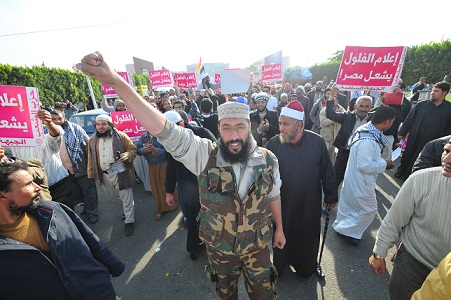CAIRO: Justice Tarek El-Beshri’s explosive statements on Al Jazeera Mubashir Misr challenging the legality of the army council’s decision to extend the emergency law, has divided activists and politicians in fierce debate.
El-Beshri based his statements on the text of the 62-article constitutional declaration that replaced the previous constitution in the interim period and which he helped draft.
Speaking to Al-Jazeera, El-Beshri pointed out that article 59 of the declaration issued by the Supreme Council of the Armed Forces (SCAF) on March 30, says that the state of emergency cannot exceed six months from the date of announcing the results of the referendum, unless the people approve its extension following a public referendum where the duration of the extension is clearly defined.
El-Beshri concluded that September 20 was legally the end of the state of emergency, since the results of the referendum were out on March 20.
He said that “extending it without a popular referendum is not possible.”
He further explained that SCAF’s recent decree 193, released after the attempted storming of the Israeli embassy, only amended the authorities of the emergency law (which was restricted to combating terrorism and drug-related crimes) did not technically extend the duration of the state of emergency.
Responding to El-Beshri’s statements, General Adel Al-Mursi, the head of military justice, told state TV that emergency law will continue until June 2012 based on the presidential decree 126 issued in 2010, extending it two more years, from June 2010 to June 2012.
Justice Ahmed El-Bardeesy, former Deputy Head of the Appeals Court, told Daily News Egypt that the constitutional declaration stated that all previously issued laws remain valid.
He explained that article 59 which El-Beshri refers to will hence not be activated before the end of the state of emergency according to law 126, 2010, which sets it at June 2012.
Al-Wasat Party issued a statement following SCAF’s announcement stating that the party considers September 30, 2011 to be the last day and hence any procedures issued in accordance with the terminated state of emergency following that date would be illegal.
"We call for the Egyptian people uphold their rights and preserve them, and protect their revolution no matter what," Aboul Ela Mady, head of Al-Wasat, said in the statement.
Presidential hopeful Mohamed ElBaradie criticized Al Mursi’s statement on his Twitter account, describing it as a “military interpretation of emergency law” which implies that “some think that we didn’t have a revolution.”
Prior to the events of Sept. 9, SCAF had announced that it was considering putting and end to emergency law before the November legislative elections.
In a statement released by the Interior Ministry following SCAF’s decision to broaden the scope of the emergency law, the ministry outlined the limits regulating its application. These include that the law will not be implemented in cases related to basic freedoms, the freedom of peaceful protest, or ideological and political orientations expressed within a legal context.

